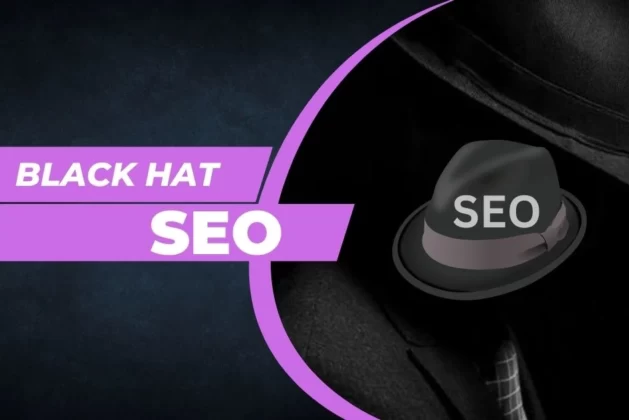Table of Contents
ToggleIntroduction
Black Hat SEO refers to unethical practices used to manipulate search engine rankings, disregarding guidelines set by search engines. These techniques aim to achieve quick results, often at the expense of user experience and long-term sustainability.
Understanding the risks and consequences of Black Hat SEO is crucial for website owners and digital marketers. Engaging in such practices can lead to severe penalties, including being banned from search engine results. It can tarnish a website’s reputation, result in loss of organic traffic, and damage brand credibility.
The objective of this blog post is to shed light on Black Hat SEO, educating readers about its definition, risks, and consequences. By providing insights into unethical techniques, we aim to emphasize the importance of ethical SEO practices for sustainable online success and discourage the use of Black Hat SEO strategies.
Understanding Black Hat SEO Techniques

Keyword Stuffing
- Definition and examples: Keyword stuffing refers to the practice of excessively using keywords in a webpage’s content, meta tags, or hidden text with the intention of manipulating search engine rankings. It involves repeating keywords unnaturally or irrelevantly, without providing valuable or meaningful content. For example, a black hat SEO practitioner may populate a webpage with repetitive keyword phrases, making the content difficult to read or understand.
- Why it’s considered black hat: Keyword stuffing is considered a black hat SEO technique because it violates search engine guidelines by attempting to deceive search algorithms rather than providing valuable content for users. It aims to manipulate search results artificially, compromising the integrity of search engine rankings.
- Potential penalties and consequences: Search engines, such as Google, are increasingly adept at identifying keyword stuffing. When detected, websites employing this technique may face severe penalties, including ranking demotion or complete removal from search engine results. Such consequences can have a detrimental impact on website visibility, organic traffic, and online reputation. Users who encounter keyword-stuffed content may have a poor user experience, resulting in decreased trust and engagement.
Check out:- Best Social Media Books for Effective Marketing Strategies
Exploitative Link Building Strategies

Paid Links and Link Farms
- Explanation of paid links and link farms: Paid links are links that are acquired by paying other websites or individuals to place them on their web pages. These links are not obtained organically or naturally, and their sole purpose is to manipulate search engine rankings. Link farms, on the other hand, are networks of websites that exist solely to provide links to other websites, often in exchange for payment. These websites typically have low-quality or irrelevant content and are created with the intention of artificially boosting link popularity.
- Why search engines penalize these practices: Search engines like Google strongly discourage the use of paid links and link farms. Such practices violate their guidelines by attempting to manipulate search engine algorithms, which aim to provide users with the most relevant and trustworthy results. Paid links and link farms undermine the credibility and accuracy of search engine rankings, compromising the quality of search results.
- Negative impact on website credibility and rankings: Engaging in paid links and link farms can have severe consequences for a website’s credibility and rankings. Search engines penalize websites involved in these practices, leading to ranking demotion or even removal from search results. Users may also perceive websites relying on paid links or link farms as untrustworthy, negatively affecting their perception of the brand or organization. Moreover, the association with low-quality or irrelevant websites from link farms can harm a website’s reputation and authority in its industry or niche.
Also Visit:- The Ultimate Guide to Cyber Security | How to Protect Your Account from Cyber Attacks?
Content Scraping and Duplicate Content

Content scraping refers to the act of copying or “scraping” content from other websites without permission and republishing it on another site. This unethical practice involves using automated tools or manual methods to extract text, images, or other media from a source website and presenting it as original content on another site without proper attribution.
Duplicate content refers to substantial blocks of content that are either identical or very similar across different web pages or websites. It poses significant challenges for search engines, as they strive to deliver unique and relevant content to their users. When search engines encounter duplicate content, they may struggle to determine the most authoritative or relevant source, leading to potential ranking dilution or exclusion from search results. Duplicate content can also confuse users, diminish their experience, and reduce the likelihood of them engaging with a website.
Using scraped or duplicate content can have severe consequences for website owners. Search engines actively penalize websites that engage in content scraping or display significant amounts of duplicate content. Penalties may include lowered rankings, diminished organic visibility, or even complete removal from search results.
Moreover, websites that utilize scraped or duplicate content risk damaging their reputation, as they are perceived as lacking originality and trustworthiness. Users prefer unique and valuable content, and when they encounter duplicate content, they may lose interest and seek alternative sources.
Negative SEO and its Dangers

Negative SEO refers to the malicious practices employed to harm a competitor’s website’s search engine rankings and reputation. Examples of negative SEO include creating low-quality backlinks, hacking a website, content scraping and duplicating, keyword stuffing on a competitor’s site, or spreading false and negative reviews about a business.
Negative SEO can have detrimental effects on websites, leading to decreased organic rankings, loss of traffic, and damage to online reputation. The harmful tactics employed by malicious individuals or competitors can trigger search engine penalties, resulting in lower visibility in search results. Additionally, if a website is hacked or injected with malware as part of a negative SEO attack, it can lead to compromised security, data breaches, and loss of user trust.
Strategies to protect your website from negative SEO attacks:
- Regularly monitor your website’s backlink profile: Keep an eye on your backlinks using tools like Google Search Console or third-party tools. Disavow any suspicious or spammy backlinks that could harm your site’s reputation.
- Strengthen website security: Implement strong security measures such as firewalls, secure passwords, and regular software updates to prevent hacking attempts and unauthorized access.
- Monitor brand mentions: Keep track of online mentions of your brand to detect any false or negative reviews or content. Respond promptly to address any issues and report any fraudulent activity to the appropriate platforms.
- Monitor website performance and user experience: Regularly check your website for any sudden drops in performance, such as increased page load times or unexpected errors. Ensure a positive user experience by maintaining high-quality content, user-friendly navigation, and mobile responsiveness.
- Implement strong SEO practices: Focus on building a solid SEO foundation with high-quality content, relevant keywords, and ethical link-building techniques. This will help your website maintain a strong online presence and be less susceptible to negative SEO attacks.
The Consequences of Black Hat SEO

Engaging in black hat SEO techniques can result in severe penalties from search engines. Search engine algorithms are constantly evolving to identify and penalize websites employing unethical practices. Penalties can range from ranking demotions to complete removal from search engine results. Common penalties include manual actions, algorithmic penalties, or being flagged as spam. These penalties can have a significant impact on a website’s visibility and online presence.
Black hat SEO techniques can lead to a loss of organic traffic and lower search engine rankings. When search engines penalize a website, its visibility in search results diminishes, resulting in fewer clicks and visits. As a result, organic traffic decreases, leading to a decline in potential leads, conversions, and revenue. A loss of rankings also means competitors may surpass the affected website, further exacerbating the negative impact on traffic and business growth.
Rebuilding reputation and recovering from black hat SEO penalties requires a multi-faceted approach. First, it’s crucial to discontinue any unethical practices and rectify any violations of search engine guidelines. Website owners must conduct a thorough audit, identify and remove any problematic content or links, and submit reconsideration requests to search engines if necessary.
To regain trust and credibility, focus on implementing white hat SEO strategies. This involves creating high-quality content that adds value to users, improving website user experience, and building organic backlinks through legitimate means. It may take time to rebuild rankings and regain the trust of search engines and users, but a commitment to ethical SEO practices and consistent efforts will help in the recovery process.
Suggested Blogs:-
Ethical and Sustainable SEO Strategies

White Hat SEO refers to the use of ethical and sustainable techniques that align with search engine guidelines. Some effective white hat strategies include:
- Keyword research and optimization: Conduct thorough keyword research to target relevant and valuable keywords. Optimize website content, meta tags, and headings to enhance visibility.
- On-page optimization: Improve website structure, HTML markup, and URL structure to make it search engine friendly.
- Quality content creation: Create informative, engaging, and unique content that provides value to users. Focus on addressing user intent and delivering the best possible user experience.
- Website optimization: Enhance website speed, mobile responsiveness, and user-friendly navigation for a seamless browsing experience.
- Technical SEO: Implement proper XML sitemaps, robots.txt files, and structured data markup to help search engines understand and crawl your website effectively.
- User engagement and social signals: Encourage user engagement through comments, social sharing, and interaction, as it indicates quality and relevance to search engines.
User experience (UX) and quality content play pivotal roles in ethical SEO. Search engines prioritize delivering the best possible results to users, making UX and content crucial ranking factors. Providing valuable, relevant, and engaging content enhances user satisfaction, encourages longer page visits, reduces bounce rates, and improves overall user experience. Optimize content for readability, structure it with headings and subheadings, and use media elements to enrich the user experience.
Building organic backlinks from reputable websites is a fundamental aspect of white-hat SEO. Focus on creating high-quality content that naturally attracts backlinks from authoritative sources. Outreach to industry influencers, collaborate with other websites and participate in relevant communities to foster relationships and gain organic backlinks. The emphasis should be on building meaningful connections and providing value, rather than engaging in manipulative link-building schemes.
Conclusion
In this blog post, we have explored the world of black hat SEO and its consequences. We defined black hat SEO and discussed various unethical techniques such as keyword stuffing, paid links, content scraping, and more. We highlighted the negative impact of these practices, including penalties from search engines, loss of organic traffic and rankings, and damage to reputation. We also emphasized the dangers of negative SEO and the importance of understanding its risks and consequences.
It is crucial to prioritize ethical SEO practices for long-term success. By following white hat techniques, such as creating quality content, optimizing websites for user experience, and building organic backlinks, website owners can establish credibility, improve search engine rankings, and provide value to their target audience. Ethical SEO not only aligns with search engine guidelines but also enhances brand reputation, fosters user trust, and leads to sustainable growth.
SEO can be complex, and if you find yourself needing assistance, it’s recommended to seek professional help from reputable SEO experts or agencies. They can provide guidance, perform audits, and help you develop and implement an effective SEO strategy tailored to your specific needs.
Frequently Asked Questions (FAQs)
Black Hat SEO refers to unethical techniques and practices used to manipulate search engine rankings. It involves tactics such as keyword stuffing, paid links, content scraping, and other strategies that violate search engine guidelines.
Engaging in Black Hat SEO can have severe consequences, including penalties from search engines, loss of organic traffic and rankings, and damage to your website’s reputation. It is not a sustainable or ethical approach to building an online presence.
White Hat SEO techniques are ethical and sustainable practices that align with search engine guidelines. These include creating quality content, optimizing websites for user experience, conducting proper keyword research, and building organic backlinks through legitimate means.
User experience plays a crucial role in SEO. Search engines prioritize delivering the best possible results to users, and websites that provide a positive user experience, such as fast loading times, easy navigation, and high-quality content, are more likely to rank higher in search results.
Quality content is essential for SEO because it attracts and engages users, increases the likelihood of earning backlinks from reputable websites, and establishes your website as a valuable resource. Search engines value informative and relevant content that satisfies user intent.



